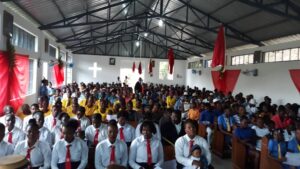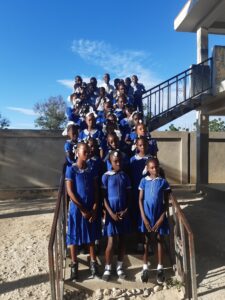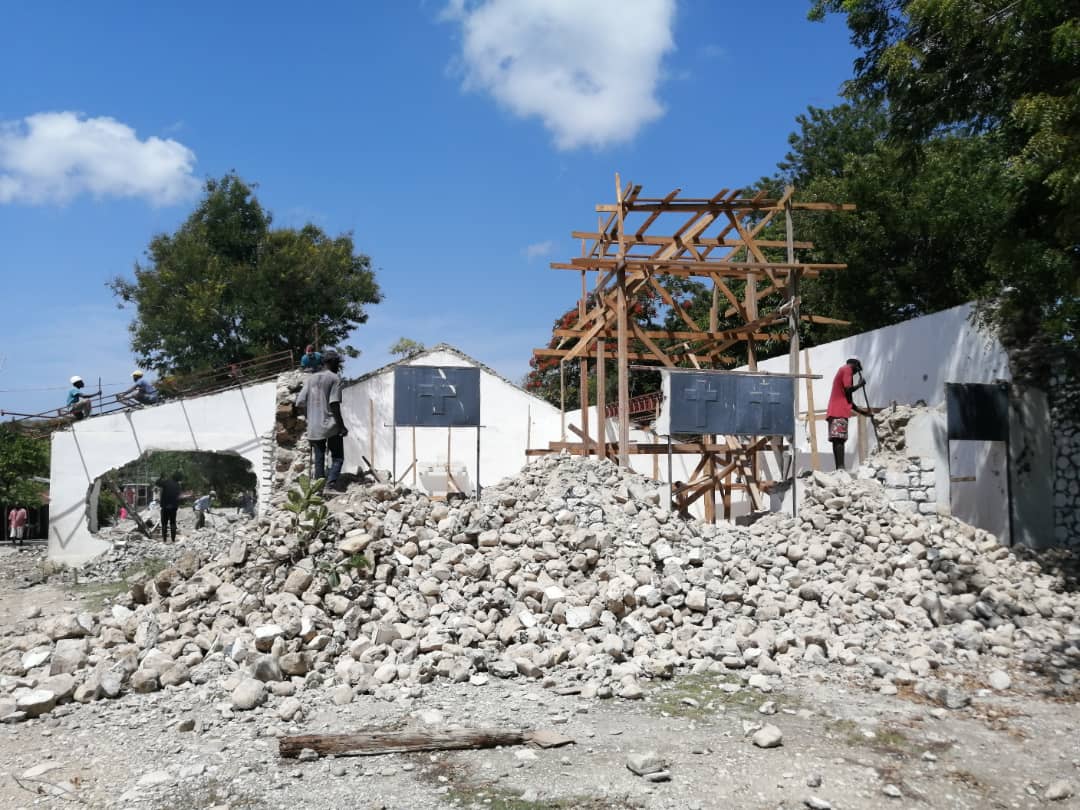Outreach volunteers hope to return to Haitian town of Boucan-Carré
By Jim Wogan
Buried beneath the pile of newspaper headlines that vividly describe the ongoing calamity and anarchy in Haiti, a volunteer ministry of the Cathedral of the Most Sacred Heart of Jesus continues its work to improve the lives of hundreds of people living in the remote village of Boucan-Carré.
The cathedral’s Haiti Outreach Program started more than 20 years ago, and since then its supporters have helped build schools, hospitals, churches, and other vital infrastructure there.
The program also provides tuition for students in Haiti and financial support for teachers and clergy.
In the past, program volunteers from the cathedral and other parishes have been able to visit Haiti in person. Those trips have been suspended while the western Caribbean nation deals with internal strife, including natural disasters and political violence.
In December, Matt Webster, president of the Haiti Outreach Program, was a guest on the “Inside the Diocese of Knoxville” podcast. He spoke about the current situation in Haiti and how the ministry keeps moving forward despite the recent challenges. The interview has been edited for space and clarity.
To what extent can you keep up with what’s going on in Haiti?
That’s a great question. I think historically this mission was the volunteers who could travel to Haiti and then see the impact of what they are doing and talk to the people and talk to the children and the mothers and the teachers and really see the impact. Since 2019, we have really had no representation from our mission able to travel. It’s just not safe, so we rely on our key folks down there.
We have a doctor, Dr. Olgenn Octave. We have Father (Michelet) Lamarre. They are the two major points of contact. Father Lamarre really acts as the financial fiduciary there. We send money down on a frequent basis, and he distributes that to the places that we have to fund, to the teachers and the parish and the medical clinic.
So, those are the two major points of contact. I am in frequent e-mail communication with them.
Does the information you get from them replicate what the media is saying about the situation there?
Well, the media focus is on Port-au-Prince, the capital of the country, where it is just anarchy. There is no other word to describe it. We are a little remote from there, so it’s not quite as intense. But what we’re experiencing now is the movement of goods and finances even from Port-au-Prince into Boucan-Carré is becoming a little riskier for our folks.
Our leadership won’t go to Port-au-Prince. There are roadblocks; nobody is off-limits, including priests, for the gangs. So, we’re a little distant from it, and only in the last six months has it really escalated in our area. The challenges are with gangs, where our folks are getting more nervous. Up to that point, they were like everything’s fine here, but that seems to be deteriorating as the gangs try to position themselves throughout the country.

Children of St. Michel Parish participate in Mass at a new chapel built on the foundation of a chicken coop.
Where is the community that you are working with located?
We call it the Diocese of Hinche. It’s more central, and the community is called Boucan-Carré. And then our clinic is in a very, very remote area called Bouly. It’s only accessible by foot and donkey, which is nearly a six-hour hike into that community.
There is nothing like that in this country (United States), where a community exists that is six hours from a main highway. That’s just the way Haiti is. And there’s a church there, and there is a medical clinic there, and then they live off the land, and we try to support that community.
Tell us about the Haiti Outreach Program at Sacred Heart Cathedral.
We have roughly 10 active volunteers. But there are 20 years of volunteers who stay involved and are curious, and we communicate with them through mail groups and newsletters.
We do three major fundraisers a year. One is called a student sponsorship, and it is our most significant fundraiser, and we ask members of our parish to help support children at the schools, and their donation covers their uniforms and their tuition, a meal, paying for the teachers, infrastructure; we have a primary school and a secondary school, and those require maintenance, and so we raise a substantial amount of money to maintain that element of the education side.
The mission really has three pillars. We call them the mind, body, and spirit. The mind is the education aspect, so we have roughly 1,000 children we’re educating a year. The body would be the medical clinic that is in the remote area of Bouly. And the spirit, we have a parish, St. Michel, with a priest and a congregation. So, mind, body, and spirit are the three foundational things we try to support.
How did this ministry get started?
It’s a spectacular story. It’s probably the most rewarding part of what we do. Go back 20-plus years when Sacred Heart had the idea of what was called “twinning” with a parish in Haiti. You select a parish and do what you can to support that parish.
We now fast-forward to today, and we’ve got two large schools. We have a medical clinic in that area. We have teachers, and we have staff. We now have a bank in the community, and we have some road structures. We have what we would call “retail” to support some of the families that live there and to support the schools and the parish.
So, what has happened, is it has really become an economic stimulus for that little community in the middle of Haiti. It has created a community and an economy because we continue to invest there, and people continue to come there to take advantage of that investment.
Haiti is not that far from Knoxville. I mean, it’s closer than Seattle.
It’s unbelievable how close it is to the United States and how bad a condition it’s in. To be that close to this country and still be in the condition that it’s in, and, in fact, connected to that same body of land is the Dominican Republic, which is a thriving economy.
It’s the same island. There is a clear border, and when that border stops it just becomes a sad story. It’s very unfortunate.
Given that, how closely are you monitoring newspapers to keep up with what’s going on?
We rely on the feedback of the priest, as I said. It doesn’t take much to read about what is going on. Anytime we see, like the New York Times article, we share that with our entire organization.
We have a following of 1,500 people on a mail group, and it’s kind of a sad state of affairs, but we rely on our priest and our doctor who are probably the key leaders there to calibrate us on how serious it is within the area we are in.
Do you partner with other parishes?
There are two other churches, one is in St. Louis, and one is in Richmond. They also have twinned with St. Michel. We collaborate.
One of them is interested in capital investment. While we spend the vast majority of our funds to maintain the infrastructure that we have, the schools, the hospital, and the teachers and the pay, this particular church, St. Anselm in St. Louis, they focus on capital investment.
Interesting story, the church there was in disrepair. It was in a very unsafe condition. It was leaking; structurally it was in tough shape. St. Anselm wanted to build a new church.
The challenge of building a new church is what do you do when you knock the church down, and for a period of time there is nowhere to go?
So, we uncovered, they called it a chicken coop. It was once designed as a chicken coop to produce revenue for the church there. That was abandoned. So, it was this dilapidated structure that St. Anselm reconditioned to a temporary chapel. They are preparing to build a new church now.
The other (parish) in Virginia is a little smaller. As they raise money, they send those funds to us, and we put that directly into education at their direction. We do the financial side for them because it’s complicated. It’s complicated to move money from here to there.
How long have you been involved?
We are new to Knoxville, came here in 2018. I was recently retired and wasn’t ready to sit on a couch. (Cathedral rector Father David Boettner) and the bishop are very passionate about this mission. So, (Father Boettner) asked me to get involved.
I feel like the business side of what we do is very much in check. We can ask our donors for money, and we can deploy that correctly and safely in Haiti and know that it’s being done correctly.
We have plenty of metrics. I ask lots of questions. I ask for reports back. We share those with our donors. I would say the business side of what we do is very much in a good place.
The sad part about it was the excitement of going to Haiti and seeing the people and seeing the success and seeing (our volunteer) doctors go to work with the children and the mothers; talking to the families and having them smile about how much we mean to them.
That is what is missing, and it’s so sad that we can’t do that. Even Father David, a priest, is uncomfortable. In fact, there is a state mandate: do not to travel to Haiti. There are massive amounts of kidnapping. We just have to tell folks to stay here, and we are just going to wrestle through it as long as we need to, and one day we will be back down there.

The Haiti Outreach Program helps fund education for roughly 1,000 children in the town of Boucan-Carré. Students line the stairs at Ecole St. Michel.
What have you learned about the early days of the ministry and how have you grown over that time?
There has been a lot. Let’s start with medical. That is probably the most visible and the one that is easy to get our arms around. Infant mortality was a significant problem, and it still is throughout the country. I don’t know the percentages, but I know that history tells us that we have made dramatic improvements in infants being born healthier than they were in this remote area of Haiti. And that is a result of people long before me, (Dr.) Jordan Pyda, (Dr.) Dean Mire, Billy Stair, those who made those trips over and over again and helped build that clinic.
We just completed a solar-panel installation (to generate electricity), which is necessary for the government to provide vaccines because those must be refrigerated. That’s a big milestone now that we can get vaccines into that community. We launched a prenatal nutritional program. We had a parishioner who was interested in that area.
So, what that means is that pregnant mothers are often lacking in nutrition. Of course, that affects the pregnancy, and that affects the birth of the child, and that just perpetuates medical problems generation after generation.
So, we focused on prenatal nutrition, meaning while these women are pregnant, can we give them supplemental assistance so that they are more healthy and therefore the child is more healthy? Not just medicine, infant nutrition. So, we are trying to get more preventive versus reactive.
On the educational side, we have two great school facilities there, and we track how the kids do on their standardized testing. (They) do pretty good on a national level. I’d say (they’re) in the top quartile, but we need to get better with our education. That is what will pull Haiti out of where they are. Intelligent, young Haitian kids that say, “I want to make a difference.” Of course, the parish, a new church is just exciting. That is a top priority for the priest there, Father Lamarre. He is all about wanting to get that church built, as most priests are.
Any hope that you can get down to Haiti soon?
We will probably go in a back door. We probably will not go through Port-au-Prince. We will come in another way, perhaps through Mirebalais, which is a larger community with an airport. Or we potentially come in through the Dominican Republic. We were very close to doing that a few months back, and certainly I want to go. We will have people on the ground there that hopefully and safely can get us to and from. Father David loves going down there as well, and when he is ready to go, I guess I will go with him and see what it’s all about. I won’t go until he is ready because he will take a lot more risk than I will with it.
God bless you for all the work you are doing.
Thank you.
Listen to the podcast episode at dioknox.org/podcasts. Learn more about the Haiti Outreach Program at haitioutreachprogram.org.

